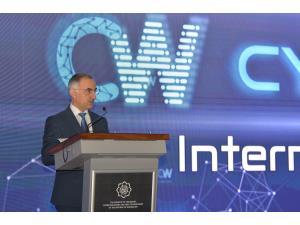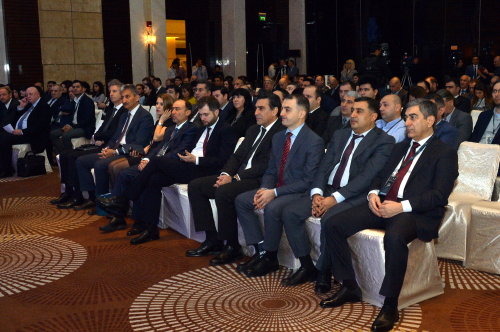



First event of the 2nd International Cyber Security Week – Cyber Security Conference kicks off

The first event of the 2nd International Cyber Security Week – Cyber Security Conference, organized on March 2-6 this year by the Ministry of Transport, Communications and High Technologies, has begun its work.
The event, which is a continuation of related activities implemented by the Ministry of Transport, Communications and High Technologies to form and develop a national ecosystem in cybersecurity, was held in partnership with more than 30 institutions, businesses and organizations within the public-private partnership.
Speaking at the conference, Deputy Minister of Transport, Communications and High Technologies Elmir Velizade said, as in all countries, Azerbaijani government pays special attention to cyber security. "Today, digital transformation in our country is proceeding rapidly. This area is in the spotlight of the Head of State. Implementation of the adopted National Strategy, Strategic Roadmap, relevant decrees and orders will provide significant results in this direction. Fiber-optic, LTE network is expanding. Preparatory work is underway for the transition to 5G, testing is ongoing. There are many critical information infrastructures in the country. Information systems of national importance are used in public administration, education, healthcare, energy, security, defense, justice, agriculture, banking and finance and other areas. Data centers are operating, Government Cloud is being created," the Deputy Minister said.
He said that 80 percent of the country’s population are internet users. All this necessitates to provide the cyber security in our country at a high level. Appropriate steps are being taken in this direction.
The Deputy Minister noted that Azerbaijan signed the Convention on Cybercrime of the Council of Europe in 2008. "Security agencies responsible for cyber security, including the Electronic Security Service under the Ministry operate in this field. Based on international standards, 18 national standards for information security have been developed and registered. Licensing of software used by government agencies is carried out. Various conferences, workshops, trainings on cyber security are held. Cyber Security Week is a good example of this."
Elmir Velizade said that one of the main targets of cyber attacks is personal and other confidential information. "In recent years, serious steps have been taken in the European Union and other developed countries to improve the legislative framework in this area. In our country, this work has also begun. The Ministry is working with relevant authorities to improve the legislative framework. Certification of work on the processing and protection of personal data is provided, as well as informing the relevant bodies and personal data subjects in case of violation of the law. We believe that these steps will contribute to cybersecurity in general."
The Deputy Minister also noted that these issues are reflected in the draft National Strategy of the Republic of Azerbaijan on Information Security and Cyber Security for 2020-2025, which is being developed jointly with relevant authorities.
Then ITU Regional Director for the CIS Natalia Mochu welcomed the participants and noted that cybersecurity is one of the key areas in the ITU’s activities. Saying Azerbaijan is a member of the ITU Council, she noted that our country is an active partner of the organization. Emphasizing the importance of cooperation between the EU member countries in this area, the ITU official underlined the significance of strengthening the efforts. She expressed confidence that the Cyber Security Week, organized by the Ministry of Transport, Communications and High Technologies, will make a valuable contribution to the exchange of knowledge and experience in this field by experts.
UNDP Resident Representative for Azerbaijan Alessandro Fracassetti said that today the Internet in the world has increasingly penetrated into many areas of activity. He stressed the importance of the benefits of digital economics, online education and virtual communication. The UN official said that ICT plays an important role in improving living standards, especially in ensuring sustainable development. According to him, the threats of cyber-attacks are not inevitable due to modern ICT applications. He said that government leaders and companies operating in the relevant field attach great importance to the training of highly qualified personnel, which is important in preventing cyber-attacks. Touching on the opportunities provided by inclusive education, Alessandro Fracassetti spoke about the active participation of disabled people and women in ICT, and the opportunities created by ICT to address unemployment. He also highlighted the importance of the "From I2B – Idea to Business" project. At the end of his speech, Alessandro Fracassetti expressed confidence that in a series of events that will be held during the week, valuable information on the work in the field will be obtained, and the exchange of knowledge and experience between local and international experts will be useful to overcome the digital divide and protect from cyberattacks.
Speaking at the event, President of the Azerbaijan Banks Association Zakir Nuriyev said that holding such events in our country is of great importance: "The challenge facing the financial sector today is not only the introduction of high technology. 27 of the banks operating in Azerbaijan provide banking applications to their customers, and 23 banks provide mobile banking Internet services using mobile technologies. One of the challenges facing us today is to reduce the cost of new technologies that we use, the cost of services provided and their implementation in economic entities."
Co-founder of Cyber Security Group Doron Tamir made a presentation on "The National Cybersecurity Ecosystem: Challenges and Opportunities." He noted that cybersecurity issues should be seen as a factor in economic growth. Speaking about the Israeli experience, Doron Tamir emphasized that his country has been dealing with cybersecurity issues since 2011 and created a National Cybersecurity Bureau. Noting that they export $ 2 million worth of cybersecurity products, Doron Tamir said that human capital is one of the key factors: "There are seven academic and research centers in Israel. Cybersecurity knowledge should be acquired from secondary schools. The transfer of professional knowledge is an important factor in the training of highly qualified personnel."
Regional director Trend Micro in CIS, Georgia and Mongolia German Pozankov presented a report on the topic "Cybersecurity of smart cities". German Pozankov said that by 2050, about 70% of the population will live in smart cities: "Subsystems of smart cities, such as smart vehicles, smart factories and smart government can be subjected to various attacks by cybercriminals depending on their goals and objectives."
The conference also featured presentations and reports of industry representatives of local and international companies on new cybersecurity solutions taking into account modern trends and challenges. In particular, presentations were made by: Vice President of MARŞ Ayan Mehdiyeva ("Cyber Insurance"), General Manager of Microsoft Azerbaijan Gachay Mirzayev ("Cyber Security of Modern Workplaces"), Executive Partner of Sabra Capital Bank and Founder of Keepgo International Telecommunications Company, Guy Zbarsky ("Investing in cyber startups"), head of cybersecurity department of company WISH Rauf Guliyev ("Cybersecurity in electronic commerce"), member of the Board of Directors of the Laboratory of Operational Technologies and Information Security LLC Andrey Bobrenko ("Cybersecurity of critical infrastructures"), lead expert of the Russian company Information Security Solution Azerbaijan / Gleg Yuri Gurkin ("Pentest of industrial and banking systems").
It should be noted that the main goal of the Cyber Security Conference is to exchange experience with local and international experts in cybersecurity, to strengthen cooperation between policy-making bodies and operating companies, and to increase the effectiveness of related activities in cyber security.
The Cyber Security Conference played the role of an invaluable platform for enhancing opportunities for cooperation in the formats question-and-answer sessions, bilateral and multilateral meetings and discussions, private sector - public sector, public sector - public sector, private sector - private sector, etc.
The Conference on Cybersecurity was attended by more than 250 authorized persons and industry experts: representatives of government agencies, private organizations, academia and universities, international organizations, mobile operators, banks, ICT companies, Internet service providers and operators, diplomatic corps, NGOs, civil society and the Internet community, USA, Hungary, Israel, Belarus, Russia, India and other countries.
In parallel with the conference, the Cyber Village exhibition was held, at which 15 local and international companies presented their cyber security solutions.

Views: 536
©ictnews.az. All rights reserved.Similar news
- Azerbaijani project to monitor disease via mobile phones
- Innovative educational system to be improved under presidential decree
- NTRC prolongs license of two TV and radio organizations for 6 years
- Azerbaijan establishes e-registry for medicines
- Azerbaijani museum introduces e-guide
- Nar Mobile opens “Nar Dunyasi” sales and service center in Siyazan city
- International conference on custom electronic services held in Baku
- OIC secretary general to attend COMSTECH meeting in Baku
- Azerbaijan develops earthquake warning system
- New law to regulate transition to digital broadcasting in Azerbaijan
- Azerbaijani State Social Protection Fund introduces electronic digital signature
- Intellectual traffic management system in Baku to be commissioned in December
- Tax Ministry of Azerbaijan started receiving video-addresses
- World Bank recommends Azerbaijan to speed up e-service introduction in real estate
- Azerbaijan to shift to electronic registration of real estate





















